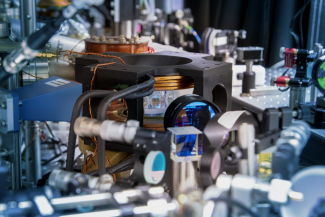The U.S. Department of Energy (DOE) has announced a $625 million investment to advance the next phase of the National Quantum Information Science Research Centers, a cornerstone of the National Quantum Initiative. This funding will support five centers dedicated to accelerating quantum technologies that promise transformative impacts on science, industry, and national security.
Among these centers, the Quantum Systems Accelerator (QSA)—led by Lawrence Berkeley National Laboratory—will continue its mission to develop practical quantum systems that can solve real-world problems. QSA brings together leading institutions to tackle challenges in quantum computing, sensing, and networking, aiming to bridge the gap between theoretical advances and deployable technologies.
JILA is proud to remain a key partner in QSA through the Q-SEnSE Institute, which focuses on quantum sensing and precision measurement. These capabilities are essential for applications ranging from navigation and timing to probing fundamental physics. JILA Fellow Jun Ye will lead the JILA effort, supported by senior investigators and JILA Fellows Cindy Regal, Adam Kaufman, Ana Maria Rey, James Thompson, Murray Holland, and Xun Gao—a team internationally recognized for pioneering work in quantum optics, atomic physics, and many-body systems.
“JILA is proud to remain a key partner in QSA. Through our work in both QSA and Q-SEnSE, JILA plays a leading role in advancing quantum innovations at the national and international levels,” remarked Inese Berzina-Pitcher, Executive Director for Q-SEnSE.
The next five years of QSA will focus on building scalable quantum platforms, advancing error correction, and integrating quantum devices into scientific workflows. JILA’s expertise in ultracold atoms, optical lattices, and quantum simulation will play a critical role in these goals.
For more details, read the official announcements:




